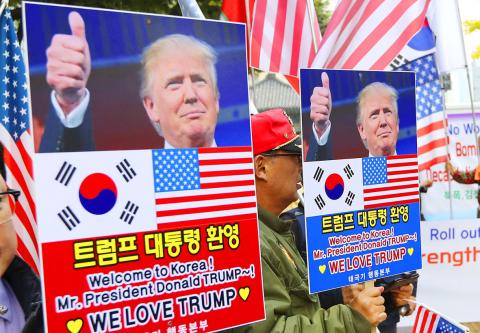US bombers on Thursday overflew the Korean Peninsula as part of an exercise with Japanese and South Korean warplanes, the US Air Force said, days before US President Donald Trump arrives in the region for a trip set to be dominated by the nuclear-armed North.
Tensions are high over Pyongyang’s ballistic missile and nuclear programs, which in recent months have seen it test intercontinental ballistic missiles and carry out its sixth nuclear detonation.
Trump’s visit is to throw a spotlight on the issue, after he and North Korean leader Kim Jong-un traded insults and threats of war.

Photo: AP
Flights by the supersonic B-1B Lancer in the area always infuriate North Korea, which early yesterday condemned the drill as “blackmail.”
Two Lancers took off from Andersen Air Force Base in Guam and were joined west of Japan by Japan Air Self-Defense Force fighters, US Pacific Air Forces said in a statement.
“The Lancers then transited overland to [South] Korea to integrate with Republic of Korea fighters in the Yellow Sea,” the statement said, adding that the aircraft later returned “to their respective home stations.”
The exercise was part of the “continuous bomber presence” mission in the Pacific and “was not in response to any current event,” the statement said.
The operation follows an Oct. 10 “show of force,” in which two Lancers staged the first nighttime joint aviation exercises with Japan and South Korea.
North Korea in July launched two intercontinental ballistic missiles apparently capable of reaching the US mainland — described by Kim as a gift to “American bastards.”
It followed up with two missiles that flew over Japan and its sixth nuclear test, by far its most powerful yet.
Trump has warned of “fire and fury” in response to Pyongyang’s threats, and derisively dubbed Kim “Little Rocket Man,” with Kim responding by calling Trump a “dotard.”
Earlier this week, the North’s Korean Central News Agency (KCNA) described the US president as “incurably mentally deranged.”
Trump was yesterday to set off on his Asian tour, which includes visits to Japan, South Korea, China, Vietnam and the Philippines.
However, his message risks being undermined if the North stages some kind of provocation, such as a missile test.
Pyongyang could be preparing for another launch, the South Korean National Intelligence Service reportedly said on Thursday.
“Active movements of vehicles have been detected at a missile research facility in Pyongyang,” Yonhap news agency quoted the intelligence agency as telling a closed-door legislative hearing.
The North habitually condemns B-1B flights as rehearsals for an attack, and KCNA yesterday said: “The reality clearly shows that the gangster-like US imperialists are the very one who is aggravating the situation of the Korean Peninsula and seeking to ignite a nuclear war.”
Any military strike in North Korea could see retaliation and rapid escalation, and much of Seoul — a city of 10 million people — is within range of the North’s artillery.
South Korean President Moon Jae-in has insisted that no military action on the peninsula can be taken without Seoul’s approval.

The CIA has a message for Chinese government officials worried about their place in Chinese President Xi Jinping’s (習近平) government: Come work with us. The agency released two Mandarin-language videos on social media on Thursday inviting disgruntled officials to contact the CIA. The recruitment videos posted on YouTube and X racked up more than 5 million views combined in their first day. The outreach comes as CIA Director John Ratcliffe has vowed to boost the agency’s use of intelligence from human sources and its focus on China, which has recently targeted US officials with its own espionage operations. The videos are “aimed at

STEADFAST FRIEND: The bills encourage increased Taiwan-US engagement and address China’s distortion of UN Resolution 2758 to isolate Taiwan internationally The Presidential Office yesterday thanked the US House of Representatives for unanimously passing two Taiwan-related bills highlighting its solid support for Taiwan’s democracy and global participation, and for deepening bilateral relations. One of the bills, the Taiwan Assurance Implementation Act, requires the US Department of State to periodically review its guidelines for engagement with Taiwan, and report to the US Congress on the guidelines and plans to lift self-imposed limitations on US-Taiwan engagement. The other bill is the Taiwan International Solidarity Act, which clarifies that UN Resolution 2758 does not address the issue of the representation of Taiwan or its people in

US Indo-Pacific Commander Admiral Samuel Paparo on Friday expressed concern over the rate at which China is diversifying its military exercises, the Financial Times (FT) reported on Saturday. “The rates of change on the depth and breadth of their exercises is the one non-linear effect that I’ve seen in the last year that wakes me up at night or keeps me up at night,” Paparo was quoted by FT as saying while attending the annual Sedona Forum at the McCain Institute in Arizona. Paparo also expressed concern over the speed with which China was expanding its military. While the US

SHIFT: Taiwan’s better-than-expected first-quarter GDP and signs of weakness in the US have driven global capital back to emerging markets, the central bank head said The central bank yesterday blamed market speculation for the steep rise in the local currency, and urged exporters and financial institutions to stay calm and stop panic sell-offs to avoid hurting their own profitability. The nation’s top monetary policymaker said that it would step in, if necessary, to maintain order and stability in the foreign exchange market. The remarks came as the NT dollar yesterday closed up NT$0.919 to NT$30.145 against the US dollar in Taipei trading, after rising as high as NT$29.59 in intraday trading. The local currency has surged 5.85 percent against the greenback over the past two sessions, central